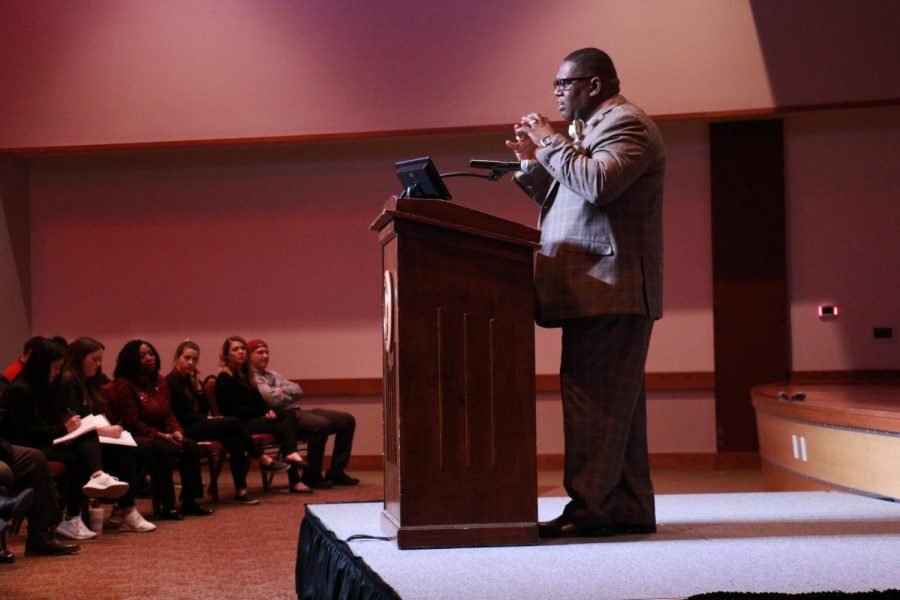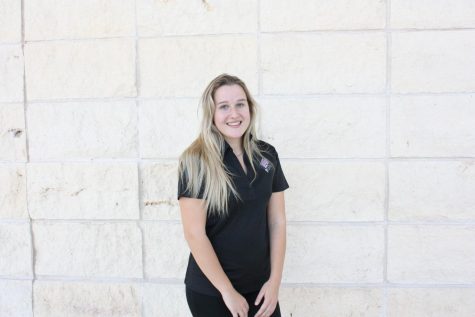Dr. Paul Frazier kicks off Black History Month at WTAMU
Dr. Paul Frazier speaks during his “Black History Yesterday and Today” speech on Thursday, Feb. 8 at Legacy Hall in the JBK Student Center.
February 15, 2018
It has been over 150 years since the 13th Amendment abolished slavery and over 50 years since the voting rights act of 1965 passed, prohibiting racial discrimination in voting.
But according to Dr. Paul Frazier, elitism is well alive and there are still places where black people socially don’t belong. He argued that prejudice and injustice is present even today as he pushed the future generations to get involved during his speech titled “Black History Yesterday and Today.”
“You can’t just stand on the sideline and talk about what’s wrong. We all know what’s wrong, but what are you personally going to do about it?’’ Frazier asked the crowd.
Frazier has a long resume including, but not limited to, serving as board member of the Lubbock American Diabetes Association, member of the Texas Alliance of Black School Educators and the 100 Black Men of West Texas. He served at Texas Tech University with the Athletics Diversity and Outreach Advisory Council, the Diversity Council and the Black Faculty to name a few.
Frazier spoke about the past, the present and a united future as the keynote speaker at the event that kicked off the Black History Month celebrations at West Texas A&M University at 7 p.m. this Thursday, Feb. 8, in the Jack B. Kelley Student Center Legacy Hall. The event was sponsored by the Black Student Union, the history department and the office for diversity and inclusion.
“A people without the knowledge of their past history, origin, and culture is like a tree without roots,” said Angela Allen, chief diversity and inclusion officer, quoting the famous black nationalism leader Marcus Garvey. “Think about that: if you don’t know your history, how on earth are you going to be prepared for your future?”
Bertha Berman who invented the fitted sheet, Garrett Morgan who invented the automated traffic light and the inventor of the home security system, Marie Van Brittan Brown, are some of the black people in history that Frazier mentioned have contributed to our world today.
“When you think about just some simple thing that improves our lifestyles, improve our day to day, we never mention those individuals or contributions that they made to America,” he said. “And to think that some of these individuals came from slaves or sharecroppers, and they were still making those contributions.’’
According to Frazier, the United States of America hold about 5 percent of the world population and 21 percent of the world’s prisoners. 34 percent of the African American population in the country were in the correctional population in 2014.
“If the African-Americans and Hispanics were incarcerated at the same rate as our Anglo brothers and sisters, the prison jail population would decline by 40 percent,’’ he said.
As Frazier discussed these social problems, he continuously asked his crowd who they thought the real enemy was.
“We’re still pointing fingers because it is another man’s fault, and we are not unified on one single thing until a tragedy happens,’’ he said. “It amazes me that we don’t come together until it’s in our own backyard.’’
He argued that people need to unite, help each other and get involved in issues to make a change.
“We have to let go of that mentality that we are victors. And if we make it, whatever making it is, we gotta keep coming back down the stairs and help people up.’’




